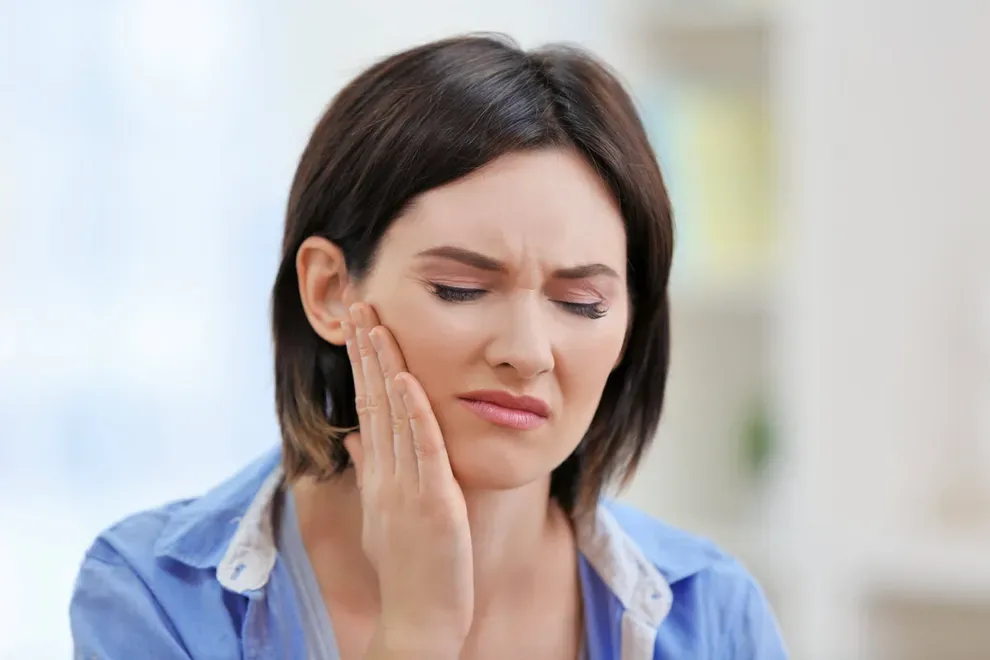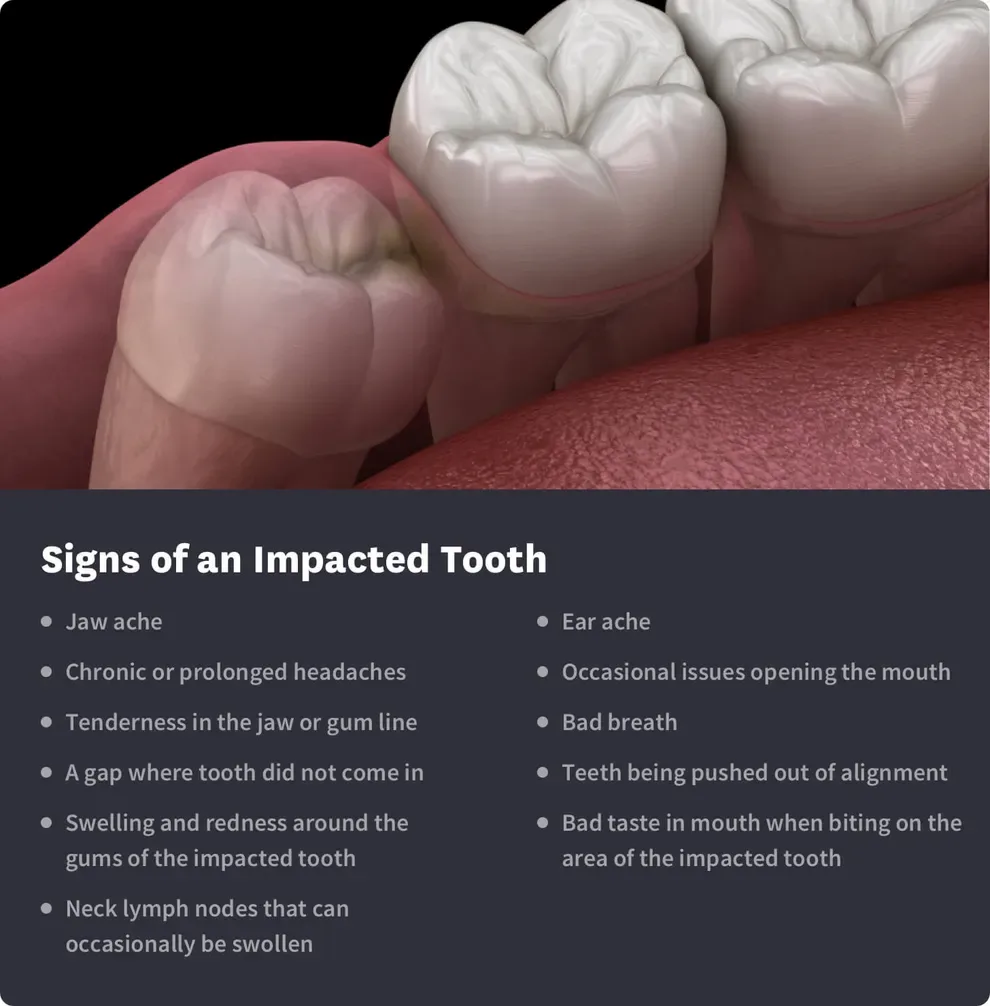Impacted Teeth: Pain Symptoms, Treatment & Recovery

Table of Contents
- What Is an Impacted Tooth?
- Causes
- Impacted Teeth Complications
- Tooth Pain Management
- Treatment Options
- Recovery Period
An impacted tooth is a tooth that does not come in all the way or at all. It is a tooth that remains imbedded in the jawbone for two or more years past the time it was supposed to erupt naturally.1
Some of the most common teeth to be impacted are the wisdom teeth, which are your third set of molars.2
An impacted tooth does not always cause problems. It can often be left alone if it causes no pain. But an impacted tooth can come in sideways or push on other teeth and cause pain or a misaligned bite. If it is partially erupted, it can trap food or debris.
If an impacted tooth is causing pain and other issues, it will often need to be removed.
When an impacted tooth is surgically removed, it usually takes about two weeks to heal completely.
What Is an Impacted Tooth?
An impacted tooth is one that is not coming in straight or on time. This can mean that the tooth is coming in the wrong direction or position, or it just does not have room to come in as it is supposed to, leaving it “stuck” in the jawbone.
Impacted teeth can also be genetic. If your parent had impacted teeth, it is more likely that you will also have an impacted tooth.
Back teeth, or wisdom teeth, are the most commonly impacted; however, other teeth can be impacted as well. Any time a tooth is unable to erupt naturally in the timeline it is supposed to, the tooth is considered to be impacted. In some cases, the tooth partially erupts through the gum line but not all the way.

Signs & Symptoms of an Impacted Tooth
An impacted tooth often has no symptoms.
It may not cause you pain or any issues that require it to be managed. In this case, the impacted tooth can often be left alone and does not require any further action.
An impacted tooth can cause a multitude of issues, however, including pain and bite misalignment. Impacted teeth are often diagnosed through an x-ray where the dentist will be able to clearly see where your tooth is and what could be causing it to be impacted.
Signs and pain symptoms of an impacted tooth can include the following:
Jaw ache
Chronic or prolonged headaches
Ear ache
Tenderness in the jaw or gum line
Occasional issues opening the mouth
Bad breath
Swelling and redness around the gums of the impacted tooth
A gap where tooth did not come in
Teeth being pushed out of alignment
Bad taste in mouth when biting on the area of the impacted tooth
Neck lymph nodes that can occasionally be swollen
An impacted tooth can often cause pressure in the area, leave you more prone to infection, and damage other teeth.3
What Causes Impacted Teeth?
Did your parents have impacted teeth? If so, you're likely to have them too. The tendency to develop impacted teeth tends to pass from parents to children, although researchers haven't identified the specific gene responsible.
When a dentist looks inside your mouth at your impacted tooth, one of these issues will likely appear:
Abnormal position: Your newly formed tooth is sitting below the gums, and it's not in the space your dentist would expect.
Crowding: The arch holding your teeth isn't large enough to hold yet another tooth.
Unhealthy neighbors: The teeth next to your impacted tooth have unusual growths or roots. They might also be in the wrong spot, blocking the path your new tooth would like to take.
3 Impacted Teeth Complications You Should Know
Some people live with impacted teeth for years and have no problems, but others suffer. These are just a few common complications associated with impaction.
1. Risk of Decay
Some impacted teeth pop up above the gum line without ever completely emerging. Teeth like this can trap food and plaque, and colonies of infection can grow in the soft tissues. Your mouth might hurt, and your breath could smell bad.
If left untreated, this infection can spread down to the bone sitting below your teeth. And your impacted tooth could decay too.
2. Tooth Damage
Some impacted teeth stay below the surface, and as they try to emerge, they push on their neighbors. Your teeth may shift and move in response to the pressure.
Soon, you may notice that your teeth don't fit together just right.
3. Pain
An impacted tooth can cause discomfort that radiates through your jaw and down to your neck. Some people complain of pain behind the eyes too.
Headaches that don't respond to typical self-care steps could be caused by impacted teeth too.
How Is Tooth Pain Managed?
The best way to make your tooth pain disappear is to visit your dentist. Removing that impacted tooth is one of the quickest ways to bring you relief.
But some people opt to keep their impacted teeth, and they use braces or other tools to pull them into place. And others need to address infections before they can do anything to remove the impacted teeth.
These self-care tips can help soothe your discomfort while you wait for the next step your dentist recommends:
Take Over-the-Counter Medications
Painkillers like ibuprofen can reduce swelling so you'll feel less pain, and your tissues will heal. Ibuprofen can be hard on your organs, so ensure you follow all directions carefully.
Gels containing benzocaine can numb sore mouth spots and bring immediate relief. Ensure that you don't have an open wound (like an erupting tooth) before using these products. Follow your dentist’s instructions for application.
Use an Ice Pack
Apply some ice to your cheek to reduce swelling. Remember to wrap the pack in something insulating (like a towel) so you don't freeze your skin.
If ice doesn't help your pain go away, switch to heat instead. Some people find that warming tools increase circulation and ease pain better than cold does.
Try a Rinse
Lukewarm water infused with salt can help wash away infections and deliver relief. Be gentle with your swishing so you don't irritate already sore tissues.
Eat Carefully
Steer clear of spicy food, and don't gnaw on any hard foods that increase your pain. Be kind to your healing mouth and sick with gentle foods that make you feel good.
Treatment Methods for an Impacted Tooth
Again, an impacted tooth may cause no issues, but it can cause pain, bite issues, infection, and tooth decay if the tooth has partially erupted and is trapping food and debris underneath it. Treating an impacted tooth will depend on the severity of the impaction, where the tooth is impacted, and what kinds of issues it is causing. Options usually include:
Oral surgery
Antibiotics or antibacterial mouthwash
Warm saltwater rinse
OTC pain medication
Orthodontia
Impacted teeth that are completely under the gum line will often need to be removed through an oral surgery procedure. This is often done at a dental office by an oral or dental surgeon who will remove the tooth and stitch up the area.
If the tooth does not need to be removed, you can often manage the pain with over-the-counter (OTC) pain medications, a warm saltwater rinse a few times per day, and antibacterial mouthwash. In the case of an infection, your dentist can prescribe antibiotics.
Partially impacted teeth are often treated with orthodontia to realign and pull the tooth out of the gum line and into the proper position.
Recovery Period
The recovery process will depend on the treatment needed for your impacted tooth. If the impacted tooth is surgically removed, you can expect about a two-week recovery process.4 Removing an impacted tooth prior to full development of the roots in young adulthood can promote a faster and easier recovery, and a less invasive surgical procedure.
After a tooth extraction, you will typically experience pain and swelling in the first few days. You will need to be careful to allow the blood clot to form fully over the area before eating solid or hard foods or brushing the area directly.
OTC pain medications and ice packs can help with swelling and discomfort. After the blood clot has formed, warm saltwater rinses can help to reduce pain and keep the area clean.
When an impacted tooth is only partially impacted, it may be able to be treated through orthodontia. The length of time in braces will depend on the level of correction needed and the extent of the crowding and misalignment in the rest of the mouth.
If you suspect an impacted tooth, consult your dentist as early as possible. Early treatment can often mean less invasive treatment and faster recovery.
Impacted Teeth FAQs
Many people live with impacted teeth for years without trouble. But if your impacted tooth causes infections, pain, or both, your dentist will need to address the problem. Generally, an impacted tooth will be removed, but in some cases, it can be treated with aligners or other teeth straightening options.
Not always. If a neighboring tooth is blocking access for your impacted tooth, your doctor could use braces or teeth aligners to make room. A method like this allows you to keep all of your teeth.
You can't fix an impacted tooth alone. You will need help from a dental professional who can either pull your teeth or apply orthodontic tools to create space in your mouth.
This is possible (though not likely) in children and teens as their teeth are still coming in, but it is nearly impossible in adults. For adults, the teeth are generally fixed in position.
